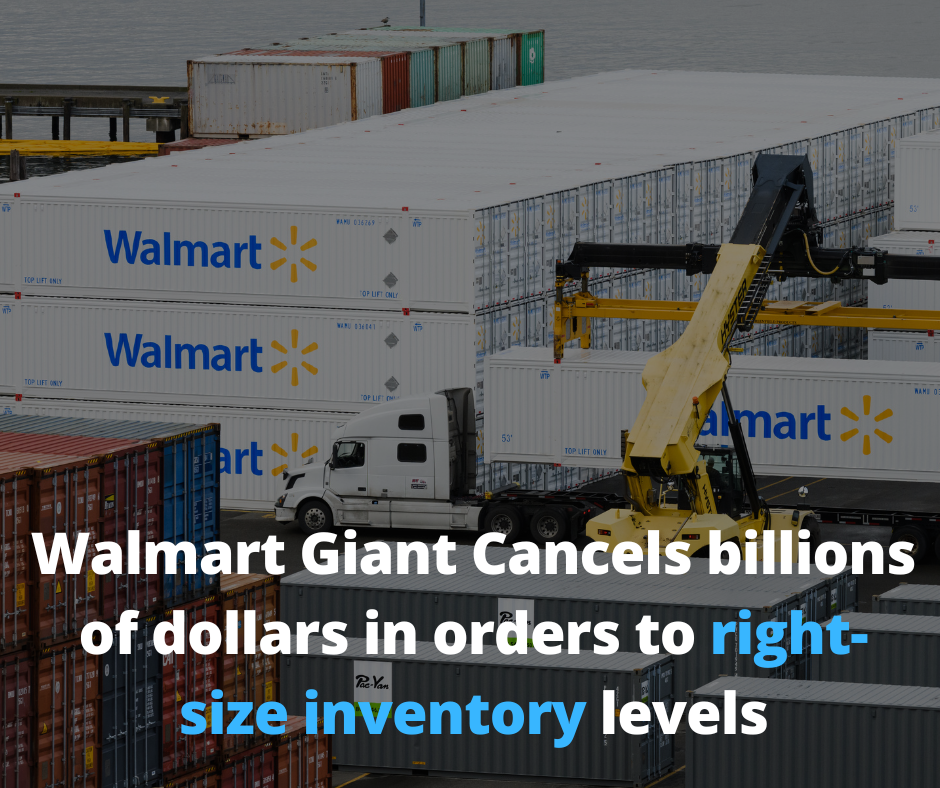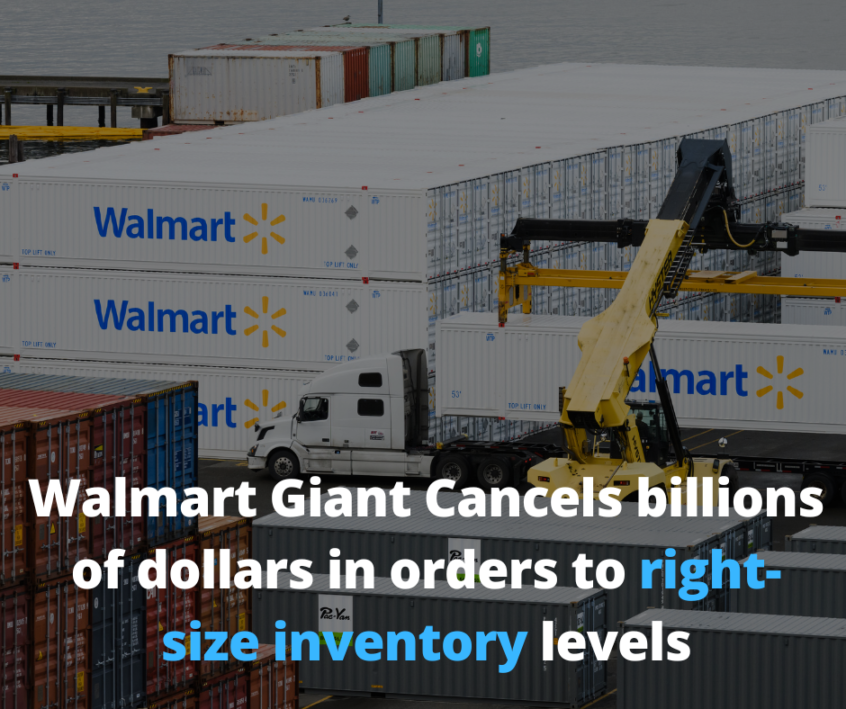
Implications for logistics and the supply chain
News on August 16 is that Walmart has canceled orders worth billions of dollars. Apparently, this move is designed to right-size inventory levels. Although surprising to some, the company states that it is part of a concerted and ongoing effort to align Walmart’s inventory levels with the projected demand. Specifically, Walmart wishes to reduce its exposure to those products its budget-conscious consumers no longer favor. All this comes amidst a flurry of important financial health news for Walmart. For example, the US division reported 26% in inventory levels for the fiscal 2nd quarter of 2023 compared to the same period in the fiscal 2022 period. This information raises questions about the implications for supply chains, logistics, and customers.
A new year with new changes
Having recorded a 750-basis-point improvement following a challenging fiscal 2023-year 1st quarter, this is a break from when the brand (NYSE: WMT) was blindsided by higher-end inventory being rejected by inflation-avoiding customers and exponentially rising costs. Executives indicated that the brand had cleared out most of its summer seasonals in preparation for the school year return, which has already started in many Southern states. Walmart is also prepping for the upcoming holiday season. Although progress has been made in right-sizing inventories, it may take at least three quarters to eliminate the accumulated imbalances.
Professor Jason Miller of the Eli Broad College of Business (Michigan State University) indicates that seasonally adjusted days-turn-inventory for Walmart has fallen to 44 days in the 2nd quarter compared to the 46 days in the previous quarter. In effect, sales are beginning to outpace order arrivals. Nevertheless, its latest actions have negatively impacted the company’s gross margins. However, it is notable that the drop for Walmart is not as bad as that experienced by Target Corp. (NYSE: TGT)., a rival retailer facing similar inventory challenges and adopting a similar corrective response.
The market responds to inventory controls
The seasonally adjusted (except for inflation) product arrivals for Walmart increased by 0.1% in the 2nd quarter compared to the first. Meanwhile, sales rose by 4.1%, meaning , inventories were drawn down. Most of the inventory inflation was linked to the 4th quarter when arrivals exceeded sales. Nevertheless, 2nd quarter financial results were a significant improvement in the 1st quarter. For example, earnings per share were $1.77, up from $1.60. Revenue was $152.9 billion, representing an 8.4% annual increment, when adjusted for currency fluctuations. Operating income was $6.9 billion, an annual fall of 6.8%.
A 5% annual increase in net sales was projected for the 3rd quarter. Additionally, Walmart projected an 8-10% decline in operating income and a 9-11% fall in earnings per share. However, shares rose more than 5% on the trading day and hit nearly $139.37 per share. This comes at a time when retailers like Target continue canceling orders to manage excess inventory that was accumulated over the previous quarters. Some have reported cancellations to avoid build-ups in warehouses and stores. Meanwhile, consumers are pivoting towards non-discretionary categories. Hence, department and big-box store retailers deal with excesses in certain discretionary categories such as apparel. The likes of Kohl’s have indicated that they will either cut down or cancel orders to keep abreast of inventory accumulations. The brands that partner with wholesale retailers will feel the pinch from these cancellations. The knock-on effects can include the logistics industry.
Consumers are trading down and business must follow suit
John Rainey, CEO of Walmart, rationalizes the aggressive cancellations by referring to an inventory glut. Increasing promotions and pulling back-order receipts is a dual approach that is expected to significantly impact inventory levels. Jill Timm, Kohl’s CFO, confirmed the same approach when engaging with investors. Colin Browne, CEO of Under Armour, reported supply chain constraints and needing to get the right inventory at the right time. The impact is seismic and sometimes includes brands that supply to wholesale partners. Columbia Sportswear said as much in July.
Wolverine Worldwide (owning Merrell, Saucony, Sperry, Hush Puppies, etc.) reported significant order postponements and a few cancellations, which it blamed for Sperry’s revenue challenges in the second quarter. Cancellations are expected to persist throughout the year, particularly in the US wholesale segment. Despite the strong communicative relationships with retail partners, Matt Puckett, CFO of VF Corporation (which owns The North Face, Vans, and Timberland) tells a similar story. Nevertheless, some brands have sailed through it all without drama. For example, David Powers, CEO of Deckers (owning the likes of Teva, Ugg, and Hoka), is not reporting a surge in order cancellations.
A complex wider international trade context
Whereas these trends are being analyzed in the US domestic market, they may be relevant to a shipping industry context facing its own changes. For example, the Port of Los Angeles sees a turning point in imports easing during August. This may make managing backlogs and delays in the logistics industry easier. If consumers are buying less, there is less cargo to worry about, even if it portends long-term concerns about the economic health of the globe. Certainly, Gene Seroka (LA port executive director) suggests that imports could fall in August despite them remaining high in July.
On Wednesday, reports indicated that the port at Los Angeles handled 935,345 twenty-foot equivalent units in July, a record best compared to other historical Julys. Volumes rose by 5% when making an annual comparison for all categories, such as empties, exports, and imports. The total imports came to 485,472 TEUs. This represented an annual increase of 3%. Certainly, it was 9% higher than the same statistic in June. Nevertheless, Seroka expects a slowing of imports. Retailers having elevated inventories to the extent of canceling means that China factory orders will begin to slow. This is particularly true of merchandise that is not repeatedly purchased annually. Examples include sporting goods, furniture, fixtures, and appliances.
Wrapping up
Overall, important shifts are taking place in the economy with far-reaching consequences. For example, wholesale retailers like Walmart are canceling or postponing orders as they avoid those products that are no longer considered budget-friendly by consumers. Meanwhile, ports like Los Angeles anticipe a reduction in imports, giving them some logistical space to deal with backlogs and bottlenecks.



